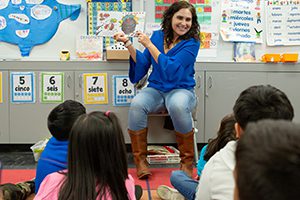Capstone Projects Are Only as Successful as the Work That Precedes Them
A capstone is a multifaceted assignment that serves as a culminating academic experience for a student, particularly high school seniors. It’s a major event because the student defends the final product (and its process) before a panel of educators and community members who have knowledge and experience in the field explored. Think: dissertation defense.
Elite, private schools have used capstones for centuries, and while they are gaining popularity in urban schools serving a majority of black and Latino students, many proponents of capstones fail to realize one important element of their success: Students in elite secondary schools write a lot — more so than students in urban schools. So much so that the capstone — whether it be a performance, science or art project, major paper, or any combination of these — is, indeed, a culminating experience. And this just isn’t the case in many predominately black and Latino urban schools, where a capstone falls far short of the promise inherent in its definition.
It appears capstones, like other major academic events, exist in many urban schools to do what school or district leaders haven’t done — that is, create a learning environment that emphasizes the importance of inquiry and frequent writing. These districts are attempting to create functional educational environments through an academic event with the hope that schools will map backward and assign more inquiry-based tasks and writing. But it’s not happening. It’s like a poorly planned wedding reception; there is food, but there are no plates. The hope that schools will inherently begin to assign more inquiry-based tasks isn’t working because educating by academic event never has. If seniors are to successfully participate in a capstone and gain valuable lessons from the experience, then inquiry-based tasks and frequent extended writing must begin in ninth grade.
Recently, I observed a meeting where teachers reviewed student work. These students were in ninth grade, and to my surprise, each student’s paper contained one sentence. Yes, just one. The teacher explained that crafting a good claim statement in ninth grade prepared students to master claim statement writing in 10th grade. At that moment, I realized today’s obsession with the elements of an argument is similar to yesteryear’s obsession with grammar and usage. They’re both roadblocks to analyzing, hypothesizing, and writing, and an imminent capstone looming overhead is unable to guide teachers around them.
But a leader with a vision can. During my interview for a teaching position in New Jersey, the department chair was adamant that every English teacher assign four pieces of writing in each class every marking period. She set the expectations for a quality learning experience, and it began with a simple number.
Why four? I don’t know. Visionaries give you confidence to trust that their vision will work. Once, after six drafts, a ninth-grade student said to me, “I’m not writing this again!” But her smile said, “Thank you for pushing me.” I imagine a similar move by a student limited by claim statements, but his refusal wouldn’t be a “thank you” in disguise.
As a culminating experience, the capstone can be a powerful tool. As the linchpin in a district’s professional development, it has no impact on the inquiry experience and frequency of writing that black and Latino students in many urban schools experience. One needs a visionary with an unwavering sense of urgency for that, one who will help teachers see that a single-sentence paper in the third marking period isn’t nearly enough, one willing to do what academic event planning cannot — and that is, make expectations around inquiry and writing visible by starting with a simple number.





